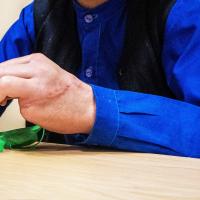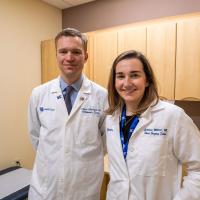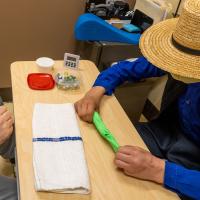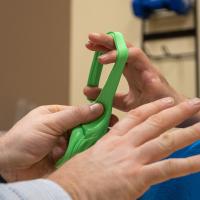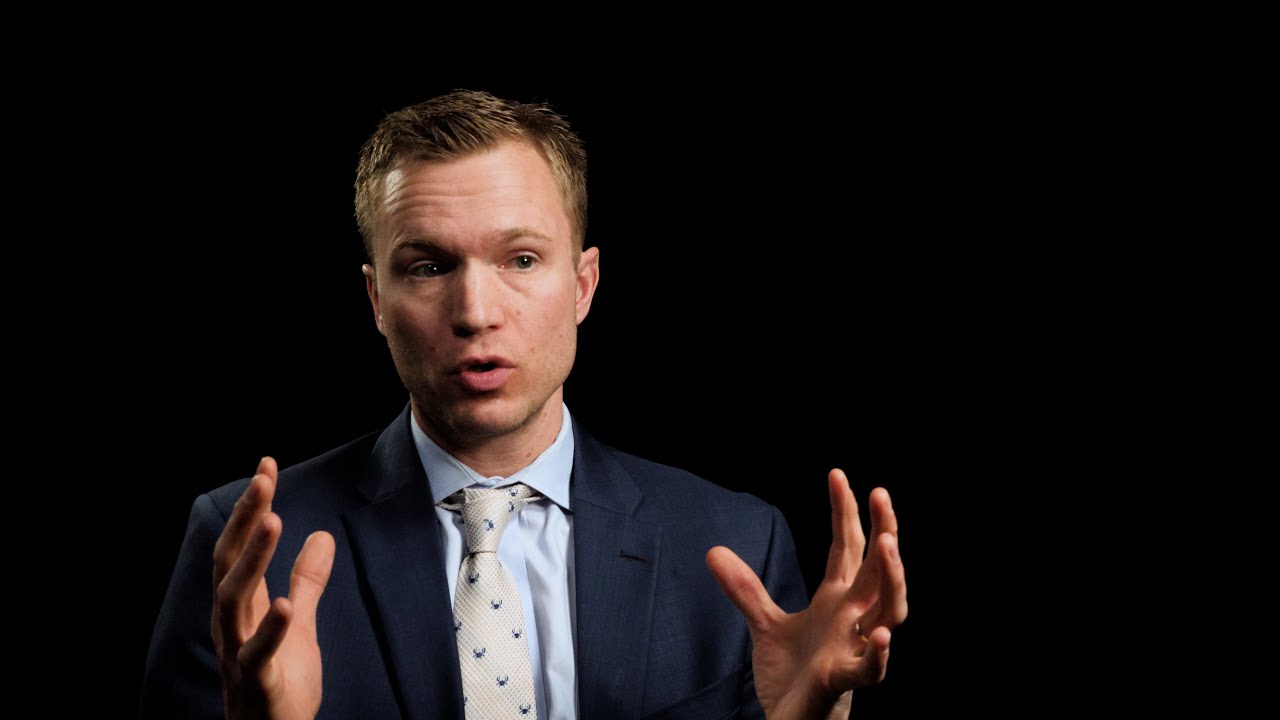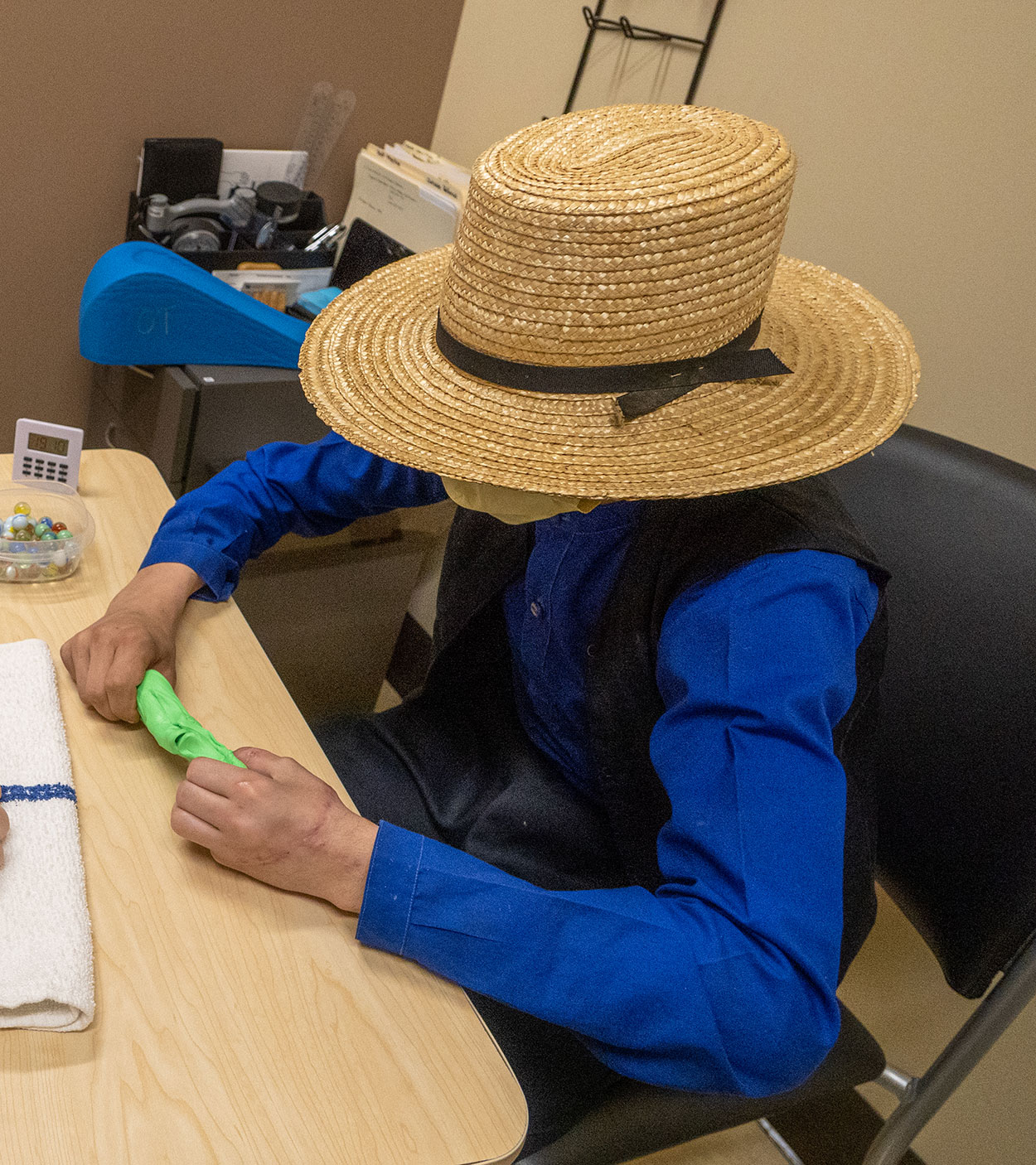



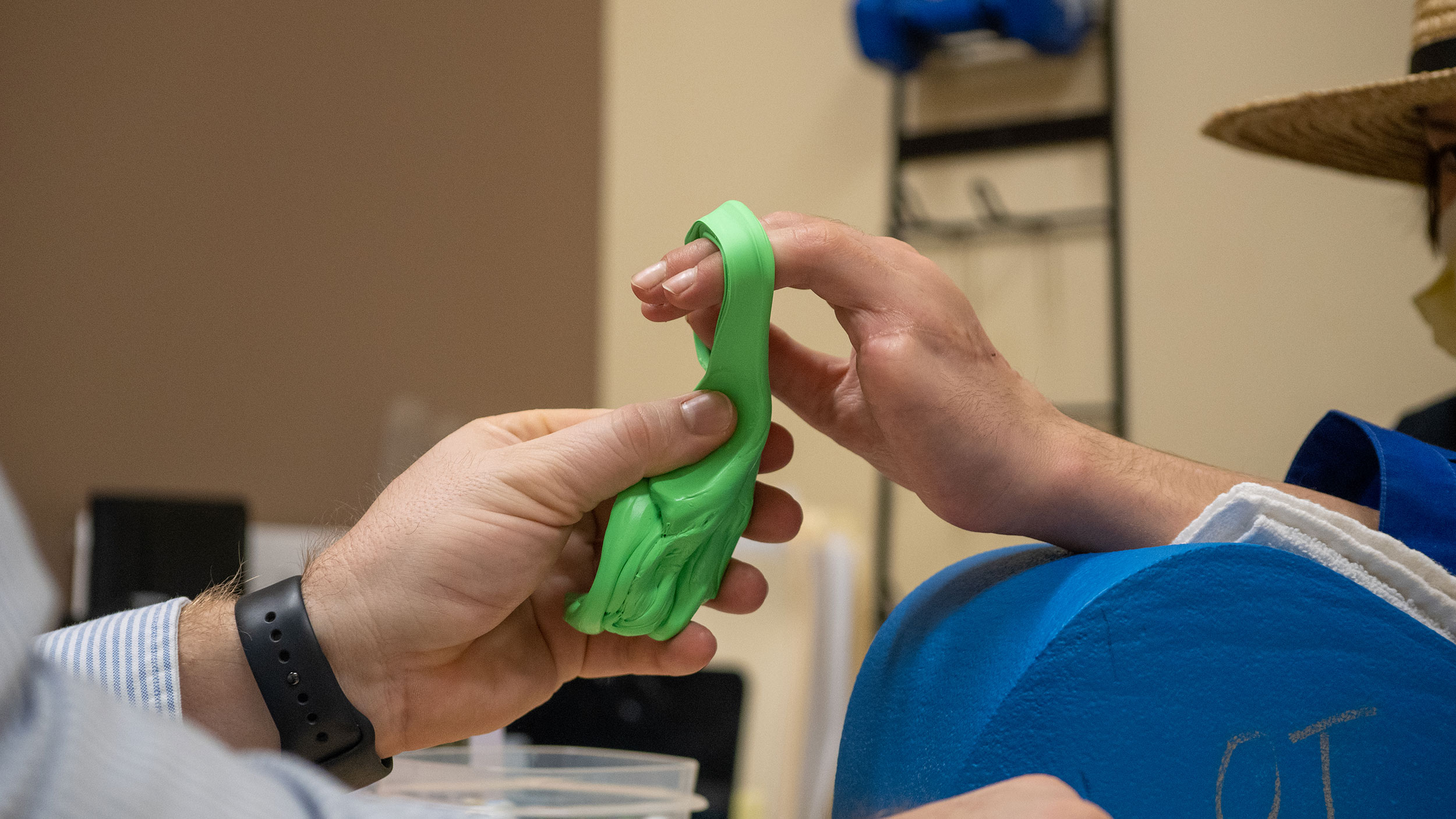

Helping Hands
It was business as usual at the Yoder family’s sawmill on Aug. 25, 2022.
Levi Yoder and his brothers were assisting their father, Noah, with the cutting of firewood on a mild morning. Levi reached for a piece of wood to pull under a saw blade, as he’d done hundreds of times before. An indiscernible sound distracted his ear, so he briefly looked back as he brought the blade down. All he noticed was the nearby clock.
At precisely 11 a.m., Levi severed most of the hand from his left arm. He had no feeling, but one of his brothers quickly alerted him to the trauma.
“My brother Henry noticed it before I did, honestly,” Levi said. “It didn’t hurt really.”
Noah Yoder quickly wrapped Levi’s arm in a towel, put his mangled hand in a bag and on ice, and flagged down a lumber driver who works with the family. They piled into his truck and rushed to Casey County Hospital, in Liberty, and from there Levi was promptly airlifted to UK Albert B. Chandler Hospital, the region’s only Level I Trauma Center.
The 13-year-old spent just one week there before he was released — with his hand reattached. Miriam, Levi’s mother, was astonished by the outcome. When it happened, she feared Levi would no longer have a left hand to use for the rest of his life.
“The day after his surgery, the first thing he said to me was, ‘Mom I can wiggle my thumb,’” Miriam said. “It was really amazing. I didn’t know if they’d even be able to put it back on.”
There are only two places in the state where Levi could have been treated and received such a positive outcome, according to Dr. Chase Kluemper, Levi’s attending surgeon.
“This is like a ‘holy grail’ type of thing,” said Dr. Kluemper, who’d never replanted an entire hand prior to Levi’s surgery. “Obviously we are proud of it, but it’s just so cool that UK is in a position to help patients like Levi.”
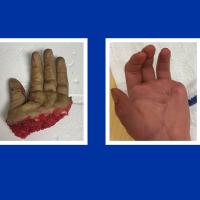
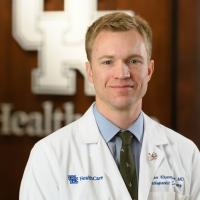
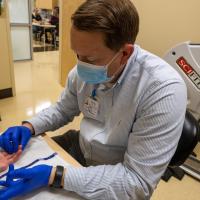
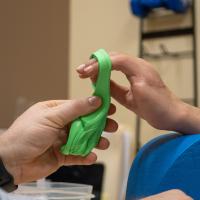
The first 24 hours
Dr. Jessica Winter was at her home when she received a text from Dr. Kluemper: “Do you want to put a hand back on?”
Dr. Winter, who is in her last year of training as a fellow at the UK Hand Center, rushed to UK Chandler Hospital and embarked on an eight-hour surgery with Dr. Kluemper.
For the replanted hand to survive, microsurgical repair of Levi’s vasculature — or blood vessels — was the first step. Two key arteries that supply blood to his fingers were severed, along with four bones, 12 tendons, 8 nerves and multiple muscles. There are many important parts to the surgery, but the most crucial step is repairing the arteries to allow blood flow to reach the fingers.
“You’ve got to get the vessels so that the hand ‘pinks up,’” Dr. Kluemper said. “And there’s a whole time-sensitivity component with it. You only have 6 hours or so before the blood vessels start to change permanently.”
Calling the surgery “successful” wasn’t even a thought until 24 hours passed. With any microsurgical procedure, the first 24 hours is “where things can go wrong,” Dr. Winter said. She and Dr. Kluemper wouldn’t start celebrating until about three days after Levi’s surgery.
“He stayed in the ICU for a week afterward and had around-the-clock neurovascular checks, because once you hook these vessels back up, there’s not a guarantee that they’re not going to clot off,” Dr. Kluemper said.
Levi’s nurses checked his circulation every two hours via ultrasound, and he kept a warming unit on his hand to encourage vasodilation, or widening of the blood vessels.
Levi spent that time in intensive care but got through his hospital stay without issue. That was at least in part due to his youth: younger patients’ blood vessels withstand trauma better than those of adults. His cool-headed demeanor made a difference as well.
“He’s an incredible kid,” Dr. Kluemper said. “He really is. Sometimes, I think certain injuries happen to people who are tough enough to withstand them. He’s got some characteristics that most kids don’t have. If this happened in a more emotionally fragile child, they probably would not have had as good of an outcome.”
The last ingredient to his successful surgery? The well-equipped team that came together to help him.
“He had our residents rounding on him the whole time,” Dr. Kluemper said. “The quality of the microscope, the availability of us, my fellow Dr. Winter who was immediately there and ready to go, the EMTs and surgery staff that got him here quickly and prepared him and his family. … When the worst happens, you need a hospital like ours.”
‘Sky’s the limit’
About six months after severing his hand, the only visual signs Levi shows of his accident are the scars from his surgery and his missing pinky finger, which wasn’t found before the family sought medical help.
For most of that six months, he attended rehab twice a week — at the UK HealthCare Hand Center and at Shriners Children's Lexington — but his progress quickly prompted a move to fewer appointments. Matthew Rose, rehab clinical coordinator with the Hand Center, and Sarah Bisher, an occupational therapist at Shriners, worked with Levi since he started rehab about 10 days after his release from UK Chandler Hospital.
In 23 years as a therapist, he says Levi’s is the worst injury he’s seen.
“He’s done amazing with his recovery,” Rose said. “I think the sky’s the limit for Levi. Usually an injury as severe as his, you need to give it at least a full year to know how it will progress. We’re still early in it, and I don’t know where he’ll end up, but he’s going to have a great outcome.”
Bisher’s team organized and provided regular transportation for the Yoder family from Casey County. The collaboration between her team at Shriners and Rose’s at the Hand Center was essential.
“Enough can’t be said about their teamwork,” Dr. Kluemper said. “Without that, Levi isn’t where he is today.”
Miriam accompanies Levi to rehab. He’s missed only one rehab appointment in six months, and that was only because the family thought it was a day later than scheduled. They don’t use computers and seldom use the phone of their lumber driver, so sticking to a schedule is paramount. Miriam makes sure that happens, in and outside of Lexington.
“Miriam’s a really nice and protective mother but always makes sure he does exactly what we ask him to do,” Dr. Kluemper said. “You can come to therapy twice a week, but if you’re not doing your exercises at home when you’re off, you’re not going to get the full benefit. You can tell she makes him do it.”
How committed was Miriam to Levi’s recovery? Doctors tell patients not to consume caffeine or chocolate in the first few days following vascular surgery because it’s vasoconstrictive, meaning it narrows the blood vessels.
It would have been fine for Levi to eat chocolate after he left the hospital, but that wasn’t explicitly communicated, so Miriam held firm; he went more than three months without eating any chocolate.
“Dr. Kluemper found that out and gave him a bunch of candy afterwards because he felt so bad,” Dr. Winter said.
That personal touch, coupled with the expertise that’s put Levi on the path to having a functional left hand again, has been reassuring to a family accustomed to leaning on its tight-knit community rather than the “outside world” in times of need.
“Everybody’s been very amazing and has helped us a lot in many ways,” Miriam said. “He’s had very good doctors, nurses and therapists. Everybody throughout has done very well.”
Often, the best outcome in cases like Levi’s is to have a “helper hand” with limited sensory and fine-motor function. That hand is likely to be stiffer than his other, and he may have issues distinguishing the finest of textures. But Levi’s sensation is almost normal, and his everyday use of the hand – thanks to his surgeons and rehab team – should be as close to 100% as it possibly could be.
Levi excitedly told Dr. Winter that, over Thanksgiving, he helped his family trap eight rabbits and shoot six squirrels without any issue.
“I was like, ‘You go buddy!’” Dr. Winter said. “As hand surgeons, we help lots of people in small ways, and help a few people in really big ways. Helping a patient like Levi kind of reinvigorates you, fills up your cup. It reminds you why you went through all your training and school.
“I left the hospital that night at 2 a.m., and I wasn’t tired at all. There’s no better feeling than knowing you put it all on the table, gave it your best shot and succeeded for your patient.”
Levi hasn’t yet returned to the sawmill, but he’s looking forward to helping his family again. Some modifications have been made to the machine in his absence.
“We’ve got a pedal there now,” Levi said with a laugh.

